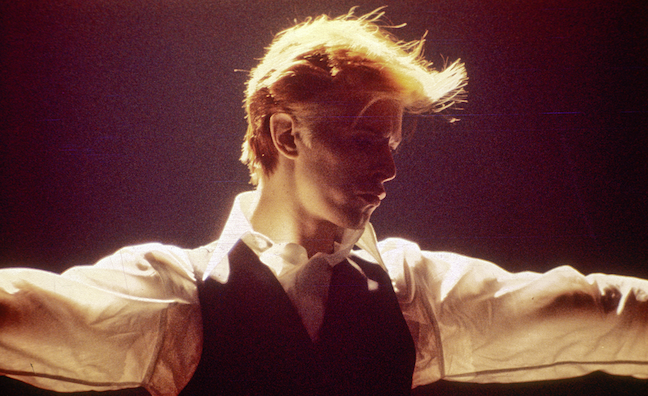On January 10, 2016, the world woke to the news that David Bowie had died, aged 69. Two years on, his music is more popular and enduring than ever, though a generation of younger fans never had the chance to see him live following his retirement, in 2004, from a remarkable live career. To mark the anniversary of his death, Music Week revisits the tributes published in our tribute edition from promoters and the agent who got to work on those groundbreaking performances...
As groundbreaking on stage as he was in the studio, David Bowie was one of the great live performers, but the rock icon stepped away from the touring circuit in 2004, never to return.
John Giddings, the star’s agent, says a comeback had never been close. “I always thought there would be a possibility of doing one or two shows,” reveals the Solo Agency MD. “I never really thought he would tour again, but he never actually said to me, I’m never touring again.”
The then 57-year-old Bowie suffered a heart attack after a concert in Schessel, Germany, on June 25, 2004, causing the remaining dates of that year’s A Reality Tour to be cancelled.
Twelve days earlier, at the Isle Of Wight Festival, Giddings had presented what transpired to be Bowie’s UK swansong - a career spanning 20-song set bookended by Rebel Rebel and Ziggy Stardust.
“The festival is on the bucket list of a lot of artists because Jimi Hendrix and The Doors played there,” says Giddings, who revived the event in 2002. “I think every artist of that calibre wants to play it at least once in their career and it fitted in with the tour of festivals we had discussed doing after his indoor tour.
“He got off the coach on the ferry and went up to the café and hung out – pretty cool seeing David Bowie on the Isle of Wight ferry,” smiles Giddings. “I remember him being on great form. He was really humble, kind and caring. He was good fun.”
Giddings had worked with Bowie since staging his 1987 Glass Spider concerts at Wembley Stadium. The tour initially garnered mixed reviews but has since been reappraised as a game-changing spectacle. “It took [stadium rock] to a different level,” believes Giddings. “It was one of the first big productions and ever since then it’s got bigger and bigger.
“He’s a true musical genius whose work will live forever, you can put him alongside Beethoven. He was at the cutting edge not only of music but also of fashion, film and photography.
“The first time he appeared on Top Of The Pops, the androgynous David Bowie, it was completely shocking to the world. He pushed the envelope for all artists to follow and I think every artist in the last 30 to 40 years has taken something from him.”
Live Nation’s US-based global touring chief Arthur Fogel, who produced Bowie’s final tour, paid tribute to “a brilliant artist and a great person”, adding: “It was a privilege and an honour to know David and to have worked with him for many years.
“I don’t know any other artist so universally revered – particularly by other artists – and rightfully so.”
Legendary promoter Harvey Goldsmith, who organised Live Aid with Bob Geldof, had known Bowie since the 1960s and staged a number of his tours. “I started working with him in about 1969,” recalls Goldsmith. “His manager got on my case and wouldn’t get off the phone, so I booked him for Hemel Hempstead Pavilion, now one of the great venues in the sky. The audience was gobsmacked.
“He was a genius because he didn’t conform, he would do a tour and then just disappear until he was ready to do whatever he wanted to do next. He had a kind of internal alarm clock and until that alarm went off inside him it didn’t matter what you threw at him in terms of opportunities, he was only ready to do it when he wanted to do it – and he was always right.”
He was a very private person, those people very close to him protected him
John Giddings
One of Bowie’s most fondly-remembered concerts of the 21st century was his return to Glastonbury in 2000. “The best gig I’ve seen here,” says co-organiser Emily Eavis. Her father, the festival’s founder, Michael Eavis, declares: “He’s one of the three greatest of all-time: Frank Sinatra, Elvis Presley and David Bowie.”
In 2002, Bowie curated the Southbank Festival’s Meltdown festival, putting together a line-up that included Coldplay, Suede, Mercury Rev, Television, Peaches, The The, The Yeah Yeah Yeahs, Badly Drawn Boy, Supergrass, The Waterboys, Philip Glass, Asian Dub Foundation and The Legendary Stardust Cowboy.
“It was one of the most intense festivals we ever did, simply because he had massive pulling power,” says the venue’s technical director Eddy Smith. “Anyone that was asked said, Yes, straight away. His name had the ability to draw a lot of people in.”
Bowie’s last public performance was in November 2006 when he sang Changes with Alicia Keys at the Black Ball fundraiser at New York’s Hammersmith Ballroom. Six months earlier, he had appeared with David Gilmour to perform Pink Floyd’s Arnold Layne and Comfortably Numb at the Royal Albert Hall, the last time he took to the stage in the UK.
“I think he wanted to bring his daughter up, spend time with her,” suggests Giddings. “He was a very private person. This has come out of the blue and none of us knew about [his illness]. Those people very close to him protected him.”









